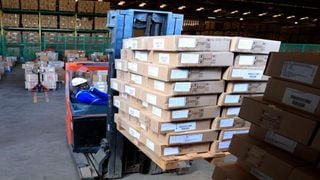
Workers offload a consignment of ARVs at the Kenya Medical Supplies Authority warehouse in Embakasi, Nairobi on April 22.
| Jeff Angote | Nation Media GroupNews
Premium
Outrage as government releases harmful ARVs to patients
What you need to know:
- Kemsa on Thursday flagged off to 31 counties 29 types of ARV drugs in 24,800 packs.
- Health Ministry banned use of Nevirapine in December 2019, but has once again released the drug to patients.
The government has come under the spotlight for releasing to Kenyans antiretroviral drugs that were phased out years back due to their adverse side effects on patients.
Included in the medication worth Sh1.2 billion were drugs that had been phased out in the country in 2019.
HIV positive patients had been put on other first line medication after reporting adverse reactions to the drugs.
Another consignment was dispatched to the remaining 16 counties from yesterday.
The phased-out drug is Zidovudine/Lamivudine/Nevirapine. The Ministry of Health indicated that Nevirapine would no longer be used in Kenya by December 2019.
However, the adult tablets that were declared unfit for use were once again being released to patients, the Nation has established.
The drugs flagged off were from an old stock donated by the Global Fund and the President's Emergency Plan for AIDS Relief (PEPFAR) and had been held at the warehouse for months.
Toxic drugs
In a meeting held with stakeholders in March last year, Kemsa indicated that it had destroyed packages of the drugs and that they were no longer in stock.
Some users of the drugs have warned that the move by the government is dangerous as some of the drugs are toxic.
“We are surprised that the drugs are still in the warehouse after we were informed that they had been destroyed. It is better to wait for the right drugs than taking toxic drugs,” said Mr Nelson Otwoma, national coordinator, National Empowerment Network of People Living with HIV/AIDS.
He said their release amounted to the government playing with people’s lives.
“Where are they taking phased out drugs, they think we are not aware of what we are taking? Why have they been keeping the drugs?” Mr Otwoma posed.
Ms Maureen Murenga, activist and executive director of Lean on Me Foundation, said the government should not politicise people’s health.
“It is heartbreaking that we have a component of medication that had been phased out because of its inferiority in strength. Kemsa had previously told us that they had destroyed what they had in store, but the list we received of the drugs that were released last week had this drug in it,” said Ms Murenga.
“It is scary since it will be given to people who have taken a stronger version of the Antiretroviral Therapy and we do not know what that will come to,” she added.
Side-effects
Nevirapine was being given as a single drug or as part of a three-drug fixed-dose combination.
Its most common side-effects include abdominal pain, rash, fatigue, headache, vomiting and muscle pain, which goes away after one month.
However, it has been associated with liver damage in some people and is registering growing resistance in many countries.
All HIV high-burden countries in sub-Saharan Africa have adopted dolutegravir-based ART as the preferred first-line regimen and dropped Nevirapine.
The World Health Organisation (WHO) first recommended DTG as an alternative first-line regimen for adults and adolescents in 2015.
The international health agency said that Nevirapine-based treatment had recorded an unacceptably high failure rate and had to be changed.
In a survey done by the WHO in 2019, 12 out of 18 countries reported pre-treatment drug resistance levels, exceeding the recommended threshold of 10 per cent.
The National AIDS and STIs Control Programme (Nascop), in a statement claimed the Nevirapine that was released is what is used as Infant Prophylaxis for HIV Exposed Infants (HEI), in children born to HIV Positive mothers who are still breastfeeding to reduce risk of HIV transmission.
Tax stalemate
“Therefore this NVP is for Prevention of Mother to Child Transmission and not for children treatment,” read the statement.
However, those who were present during the flag off said the Nevirapine drugs were tablets, and not syrups.
“We have been asking the government for over a year now to release the infants’ drugs and we have always been told that they will be shipped? When did they get to the country? Last week we were told that they were going to be airlifted, why are they playing games with Kenyans?” Mr Otwoma questioned.
“Is it really practical to be told that there are no drugs then someone somewhere says that the drugs that were being flagged off were for children? For almost a year now, we have not had infant drugs,” he added.
The Nation has also learnt that Nevirapine syrup was part of the consignment that is being held at the Port of Mombasa due to the tax stalemate between the government and USAid.
The donor insists that it will not release the drugs until all the sticking points are resolved, putting those in dire need of the drugs in limbo.
“It is important to clarify that the medications referred to in parliamentary testimony are actually from another donor, Global Fund, and not from USAid. As the largest contributor to the Global Fund, the United States is proud that we can once again help the people of Kenya. The donation from the American people through USAid of medications and medical supplies that were stuck at Mombasa port remain in USAid’s possession until our deliberations conclude,” the US embassy spokesperson told the Nation.
Stuck at the port, as per the document, are 258,954 packs of Tenofovir, Lamivudine Dolutegravir (TLD).The consignment arrived on January 18.






